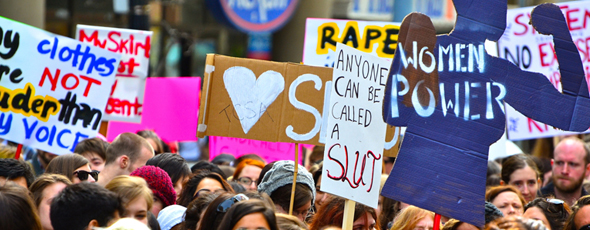
The past few weeks have seen a fair few spats surrounding columnists Suzanne Moore and Caitlin Moran. The pattern was always the same: A columnist says something awful which contributes to the oppression of less privileged minorities, people call them out, and the commentariat closes ranks around them for protection. The defence was the same: a decrying of intersectional thinking and pleas to focus on the “good” things that have been said instead of the bad.
This simply will not do. Flavia Dzodan’s rallying cry holds true: “My feminism will be intersectional, or it will be bullshit!” There is no single type of oppression, and there is none that is most important to tackle first. We must look at how these oppressions interact with one another and attempt to mitigate these circumstances. We can never get anything done if we continue to think one-dimensionally.
Suzanne Moore has written well on class and feminism, yet made comments which were heavily steeped in transphobia, normalising these attitudes to the point where the Observer commissioned and published Julie Burchill’s infamous slur-riddled diatribe. Even after the Observer retracted the article, Moore was still allowed to spread distortions about how trans people had orchestrated unfair bullying against her. Meanwhile, Caitlin Moran, while reasonably good on writing accessible “Feminism 101” works, has made flabbergastingly thoughtless remarks about, among others, trans women and women of colour. Just because these writers have written well on other issues does not mean they get a free pass for the things which merit criticism.
To the minds of the commentariat, though, intersectionality is the bad guy. Criticising oppressive comments apparently detracts from the importance of some sort of perceived “real struggle”. People do not want to think about how sometimes they can be the oppressor.
The commentariat class is predominantly white, male, heterosexual, able-bodied, cisgendered and from a well-off economic background. Sure, there’ll be some women, and some gay people, and some who grew up working-class (although, now, are raking in a comfortable columnists’ salary). For the most part, though, there isn’t much intersectional oppression going on and they have the luxury of ignoring this reality.
The first problem here is that people with privilege tend to slip up. I’ve done it a thousand times myself. Often it comes not from a place of hate, but from a place of ignorance: it’s hard to know what’s a racist thing to say if you have never experienced racism, for example. There is a way of mitigating these effects of privilege, which I strive to do: I listen to criticism, I proactively read, speak to people, and learn. I consider myself a work in progress and endeavour not to inadvertently become the oppressor. Alternatively, one can follow the commentariat’s route, and pretend that none of this actually matters as there are more important things to do.
Another major problem with the commentariat is that of its platform. Put simply, what they say reaches a far greater audience than any rebuttal from those they may harm with their comments. There is not much space within traditional media channels (which are predominantly owned by those who benefit from the status quo) for many voices. This is a terrible situation, as it means that a rejection of intersectional thinking can now become the mainstream as the commentariat closes rank against a perceived attack. The voices of the oppressed, and those fighting oppression, are drowned out. The status quo is comfortably maintained.
These two factors intersect to exacerbate the problem further. Due to the paucity of women and queers and people of colour and so forth within the commentariat class, those who are from one of these groups are fighting an uphill struggle to maintain their platforms and might be less willing to rock the boat. But perhaps some members of the commentariat need to realise that in order to do intersectionality better, they may occasionally have to concede their platform so someone better placed to speak – someone who experiences different kinds of oppression – may do so.
This is not to excuse the backlash against intersectionality: in fact, it attests that entry into the mainstream commentariat is just about the worst way of achieving social justice. I wish fervently that we could ignore these privileged voices saying privileged things, but their distortions and myths reach far more ears than ours.
This is why we must call out oppression where we see it, and why we can be angry and infuriated by this sorry state of affairs. Perhaps it will change. Perhaps we will eventually abandon the commentariat model in favour of something better and brighter. I can only see the present and not the future – and it is a present which sorely needs a major edit.
By Zoe Stavri (@stavvers)

This work is licensed under a Creative Commons Attribution-NonCommercial-ShareAlike 3.0 Unported License.









